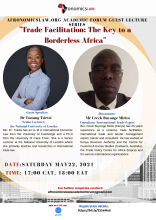Symposium: Assessing the First Years of Implementation of the AFCFTA: Challenges and Opportunities — The Guided Trade Initiative: An Appraisal of AfCFTA National Implementation Vehicles
The African Continental Free Trade Area (AfCFTA) is the world’s largest free trade area in terms of the participating countries since the formation of the World Trade Organization (WTO). The AfCFTA Agreement brings together 55 African Countries who are contracting member states to the 8 existing Regional Economic Communities in Africa, including the newly formed Alliance of Sahel States (former members of ECOWAS). As of September 2024, 54 of the 55 AU member states have signed the AfCFTA Agreement and 47 have ratified the Agreement. The AfCFTA aims to create a single market for trade in goods and services and allow free access to tradeable commodities across the continent. Although the AfCFTA is not fully operational, meaningful commercial trading has been envisioned through the Guided Trade Initiative (GTI). The GTI is a pilot project that tests the operational, institutional, legal and trade policy environment of the AfCFTA.
